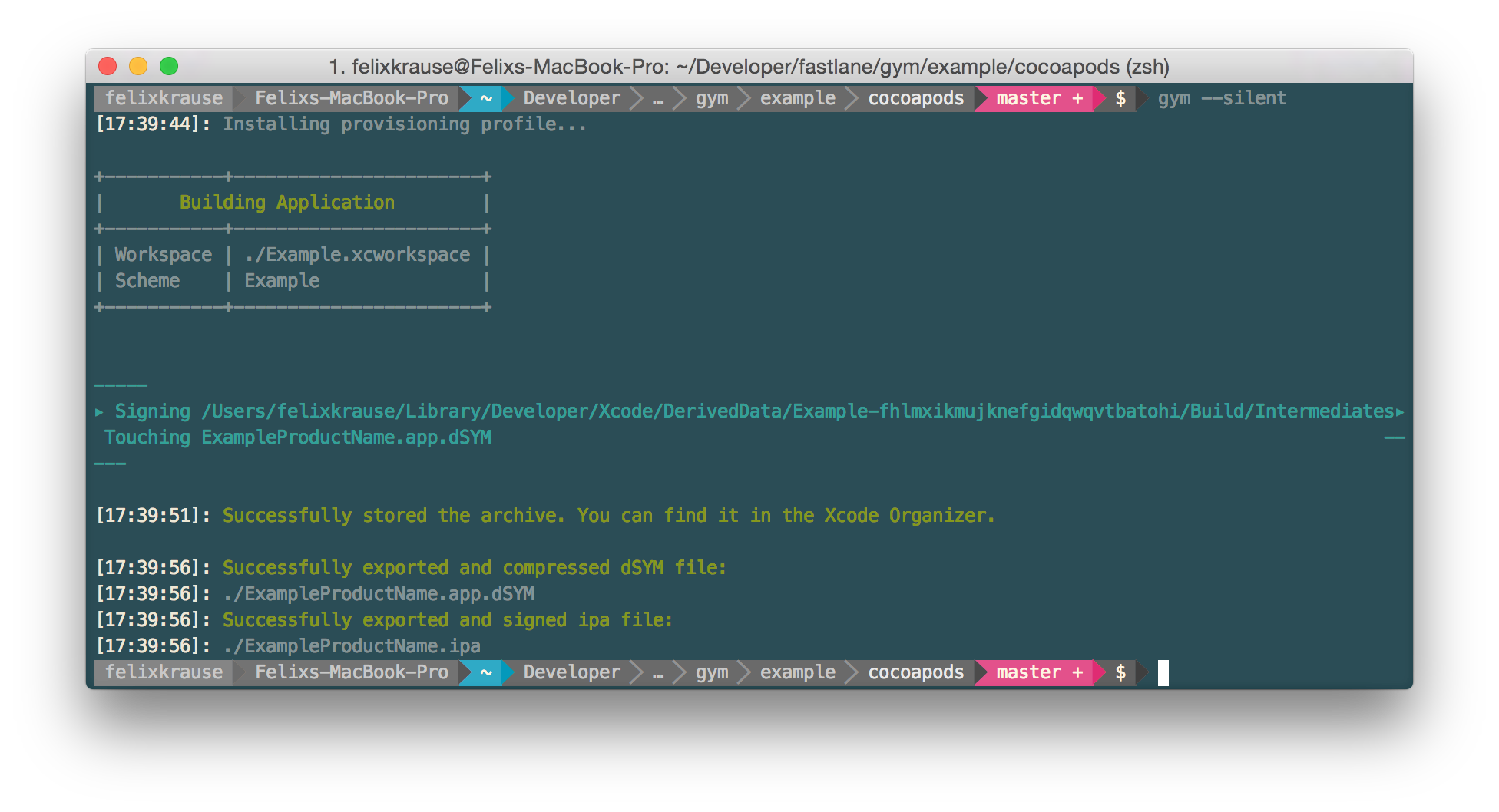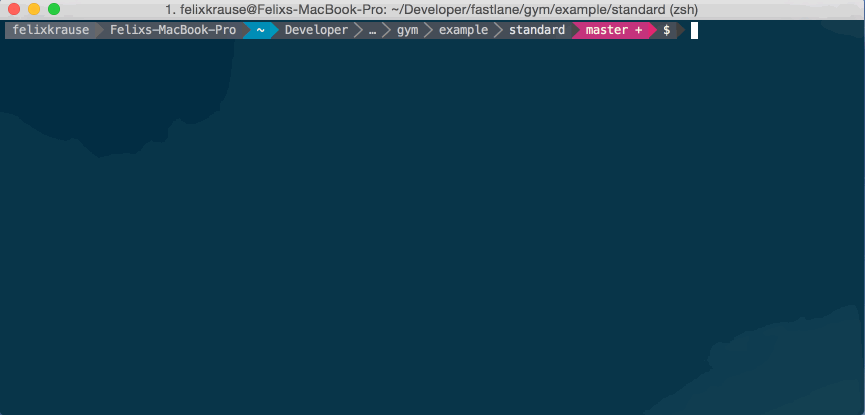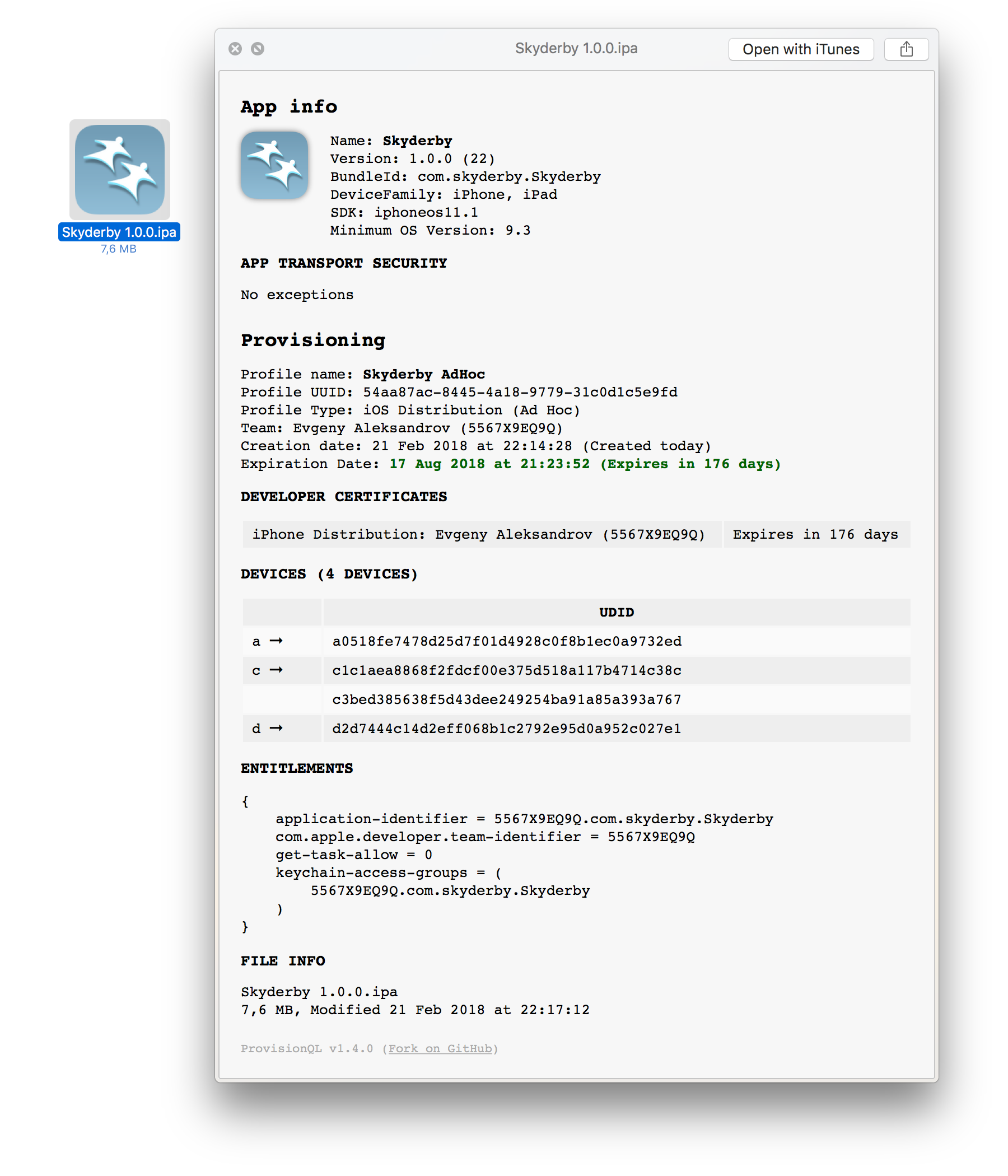build_app
Easily build and sign your app (via gym)

gym is part of fastlane: The easiest way to automate beta deployments and releases for your iOS and Android apps.
What's gym?
gym builds and packages iOS apps for you. It takes care of all the heavy lifting and makes it super easy to generate a signed ipa or app file 💪
gym is a replacement for shenzhen.
Before gym
xcodebuild clean archive -archivePath build/MyApp \
-scheme MyApp
xcodebuild -exportArchive \
-exportFormat ipa \
-archivePath "build/MyApp.xcarchive" \
-exportPath "build/MyApp.ipa" \
-exportProvisioningProfile "ProvisioningProfileName"
With gym
fastlane gym
Why gym?
gym uses the latest APIs to build and sign your application which results in much faster build times.
| gym Features | |
|---|---|
| 🚀 | gym builds 30% faster than other build tools like shenzhen |
| 🏁 | Beautiful inline build output |
| 📖 | Helps you resolve common build errors like code signing issues |
| 🚠 | Sensible defaults: Automatically detect the project, its schemes and more |
| 🔗 | Works perfectly with fastlane and other tools |
| 📦 | Automatically generates an ipa and a compressed dSYM file |
| 🚅 | Don't remember any complicated build commands, just gym |
| 🔧 | Easy and dynamic configuration using parameters and environment variables |
| 💾 | Store common build settings in a Gymfile |
| 📤 | All archives are stored and accessible in the Xcode Organizer |
| 💻 | Supports both iOS and Mac applications |


Usage
fastlane gym
That's all you need to build your application. If you want more control, here are some available parameters:
fastlane gym --workspace "Example.xcworkspace" --scheme "AppName" --clean
If you need to use a different Xcode installation, use [xcodes](https://docs.fastlane.tools/actions/xcodes) or define DEVELOPER_DIR:
DEVELOPER_DIR="/Applications/Xcode6.2.app" fastlane gym
For a list of all available parameters use
fastlane action gym
If you run into any issues, use the verbose mode to get more information
fastlane gym --verbose
Set the right export method if you're not uploading to App Store or TestFlight:
fastlane gym --export_method ad-hoc
To pass boolean parameters make sure to use gym like this:
fastlane gym --include_bitcode true --include_symbols false
To access the raw xcodebuild output open ~/Library/Logs/gym
Gymfile
Since you might want to manually trigger a new build but don't want to specify all the parameters every time, you can store your defaults in a so called Gymfile.
Run fastlane gym init to create a new configuration file. Example:
scheme("Example")
sdk("iphoneos9.0")
clean(true)
output_directory("./build") # store the ipa in this folder
output_name("MyApp") # the name of the ipa file
Export options
Since Xcode 7, gym is using new Xcode API which allows us to specify export options using plist file. By default gym creates this file for you and you are able to modify some parameters by using export_method, export_team_id, include_symbols or include_bitcode. If you want to have more options, like creating manifest file for app thinning, you can provide your own plist file:
export_options("./ExportOptions.plist")
or you can provide hash of values directly in the Gymfile:
export_options({
method: "ad-hoc",
manifest: {
appURL: "https://example.com/My App.ipa",
},
thinning: "<thin-for-all-variants>"
})
Optional: If gym can't automatically detect the provisioning profiles to use, you can pass a mapping of bundle identifiers to provisioning profiles:
build_app(
scheme: "Release",
export_method: "app-store",
export_options: {
provisioningProfiles: {
"com.example.bundleid" => "Provisioning Profile Name",
"com.example.bundleid2" => "Provisioning Profile Name 2"
}
}
)
Note: If you use fastlane with match you don't need to provide those values manually, unless you pass a plist file into export_options
For the list of available options run xcodebuild -help.
Setup code signing
Automating the whole process
gym works great together with fastlane, which connects all deployment tools into one streamlined workflow.
Using fastlane you can define a configuration like
lane :beta do
scan
gym(scheme: "MyApp")
crashlytics
end
# error block is executed when a error occurs
error do |lane, exception|
slack(
# message with short human friendly message
message: exception.to_s,
success: false,
# Output containing extended log output
payload: { "Output" => exception.error_info.to_s }
)
end
When gym raises an error the error_info property will contain the process output
in case you want to display the error in 3rd party tools such as Slack.
You can then easily switch between the beta provider (e.g. testflight, hockey, s3 and more).
How does it work?
gym uses the latest APIs to build and sign your application. The 2 main components are
xcodebuild- xcpretty
When you run gym without the --silent mode it will print out every command it executes.
To build the archive gym uses the following command:
set -o pipefail && \
xcodebuild -scheme 'Example' \
-project './Example.xcodeproj' \
-configuration 'Release' \
-destination 'generic/platform=iOS' \
-archivePath '/Users/felixkrause/Library/Developer/Xcode/Archives/2015-08-11/ExampleProductName 2015-08-11 18.15.30.xcarchive' \
archive | xcpretty
After building the archive it is being checked by gym. If it's valid, it gets packaged up and signed into an ipa file.
gym automatically chooses a different packaging method depending on the version of Xcode you're using.
Xcode 7 and above
/usr/bin/xcrun path/to/xcbuild-safe.sh -exportArchive \
-exportOptionsPlist '/tmp/gym_config_1442852529.plist' \
-archivePath '/Users/fkrause/Library/Developer/Xcode/Archives/2015-09-21/App 2015-09-21 09.21.56.xcarchive' \
-exportPath '/tmp/1442852529'
gym makes use of the new Xcode 7 API which allows us to specify the export options using a plist file. You can find more information about the available options by running xcodebuild --help.
Using this method there are no workarounds for WatchKit or Swift required, as it uses the same technique Xcode uses when exporting your binary.
Note: the xcbuild-safe.sh script wraps around xcodebuild to workaround some incompatibilities.
Use 'ProvisionQL' for advanced Quick Look in Finder
Install ProvisionQL.
It will show you ipa files like this:

| build_app | |
|---|---|
| Supported platforms | ios, mac |
| Author | @KrauseFx |
| Returns | The absolute path to the generated ipa file |
5 Examples
build_app(scheme: "MyApp", workspace: "MyApp.xcworkspace")
build_app(
workspace: "MyApp.xcworkspace",
configuration: "Debug",
scheme: "MyApp",
silent: true,
clean: true,
output_directory: "path/to/dir", # Destination directory. Defaults to current directory.
output_name: "my-app.ipa", # specify the name of the .ipa file to generate (including file extension)
sdk: "iOS 11.1" # use SDK as the name or path of the base SDK when building the project.
)
gym # alias for "build_app"
build_ios_app # alias for "build_app (only iOS options)"
build_mac_app # alias for "build_app (only macOS options)"
Parameters
| Key | Description | Default |
|---|---|---|
workspace |
Path to the workspace file | |
project |
Path to the project file | |
scheme |
The project's scheme. Make sure it's marked as Shared |
|
clean |
Should the project be cleaned before building it? | false |
output_directory |
The directory in which the ipa file should be stored in | . |
output_name |
The name of the resulting ipa file | |
configuration |
The configuration to use when building the app. Defaults to 'Release' | * |
silent |
Hide all information that's not necessary while building | false |
codesigning_identity |
The name of the code signing identity to use. It has to match the name exactly. e.g. 'iPhone Distribution: SunApps GmbH' | |
skip_package_ipa |
Should we skip packaging the ipa? | false |
skip_package_pkg |
Should we skip packaging the pkg? | false |
include_symbols |
Should the ipa file include symbols? | |
include_bitcode |
Should the ipa file include bitcode? | |
export_method |
Method used to export the archive. Valid values are: app-store, validation, ad-hoc, package, enterprise, development, developer-id and mac-application | |
export_options |
Path to an export options plist or a hash with export options. Use 'xcodebuild -help' to print the full set of available options | |
export_xcargs |
Pass additional arguments to xcodebuild for the package phase. Be sure to quote the setting names and values e.g. OTHER_LDFLAGS="-ObjC -lstdc++" | |
skip_build_archive |
Export ipa from previously built xcarchive. Uses archive_path as source | |
skip_archive |
After building, don't archive, effectively not including -archivePath param | |
skip_codesigning |
Build without codesigning | |
catalyst_platform |
Platform to build when using a Catalyst enabled app. Valid values are: ios, macos | |
installer_cert_name |
Full name of 3rd Party Mac Developer Installer or Developer ID Installer certificate. Example: 3rd Party Mac Developer Installer: Your Company (ABC1234XWYZ) |
|
build_path |
The directory in which the archive should be stored in | |
archive_path |
The path to the created archive | |
derived_data_path |
The directory where built products and other derived data will go | |
result_bundle |
Should an Xcode result bundle be generated in the output directory | false |
result_bundle_path |
Path to the result bundle directory to create. Ignored if result_bundle if false |
|
buildlog_path |
The directory where to store the build log | * |
sdk |
The SDK that should be used for building the application | |
toolchain |
The toolchain that should be used for building the application (e.g. com.apple.dt.toolchain.Swift_2_3, org.swift.30p620160816a) | |
destination |
Use a custom destination for building the app | |
export_team_id |
Optional: Sometimes you need to specify a team id when exporting the ipa file | |
xcargs |
Pass additional arguments to xcodebuild for the build phase. Be sure to quote the setting names and values e.g. OTHER_LDFLAGS="-ObjC -lstdc++" | |
xcconfig |
Use an extra XCCONFIG file to build your app | |
suppress_xcode_output |
Suppress the output of xcodebuild to stdout. Output is still saved in buildlog_path | |
xcodebuild_formatter |
xcodebuild formatter to use (ex: 'xcbeautify', 'xcbeautify --quieter', 'xcpretty', 'xcpretty -test'). Use empty string (ex: '') to disable any formatter (More information: https://docs.fastlane.tools/best-practices/xcodebuild-formatters/) | * |
build_timing_summary |
Create a build timing summary | false |
disable_xcpretty |
DEPRECATED! Use xcodebuild_formatter: '' instead - Disable xcpretty formatting of build output |
|
xcpretty_test_format |
Use the test (RSpec style) format for build output | |
xcpretty_formatter |
A custom xcpretty formatter to use | |
xcpretty_report_junit |
Have xcpretty create a JUnit-style XML report at the provided path | |
xcpretty_report_html |
Have xcpretty create a simple HTML report at the provided path | |
xcpretty_report_json |
Have xcpretty create a JSON compilation database at the provided path | |
xcpretty_utf |
Have xcpretty use unicode encoding when reporting builds | |
analyze_build_time |
Analyze the project build time and store the output in 'culprits.txt' file | |
skip_profile_detection |
Do not try to build a profile mapping from the xcodeproj. Match or a manually provided mapping should be used | false |
xcodebuild_command |
Allows for override of the default xcodebuild command |
xcodebuild |
cloned_source_packages_path |
Sets a custom path for Swift Package Manager dependencies | |
skip_package_dependencies_resolution |
Skips resolution of Swift Package Manager dependencies | false |
disable_package_automatic_updates |
Prevents packages from automatically being resolved to versions other than those recorded in the Package.resolved file |
false |
use_system_scm |
Lets xcodebuild use system's scm configuration | false |
* = default value is dependent on the user's system
Lane Variables
Actions can communicate with each other using a shared hash lane_context, that can be accessed in other actions, plugins or your lanes: lane_context[SharedValues:XYZ]. The build_app action generates the following Lane Variables:
| SharedValue | Description |
|---|---|
SharedValues::IPA_OUTPUT_PATH |
The path to the newly generated ipa file |
SharedValues::PKG_OUTPUT_PATH |
The path to the newly generated pkg file |
SharedValues::DSYM_OUTPUT_PATH |
The path to the dSYM files |
SharedValues::XCODEBUILD_ARCHIVE |
The path to the xcodebuild archive |
To get more information check the Lanes documentation.
Documentation
To show the documentation in your terminal, run
fastlane action build_app
CLI
It is recommended to add the above action into your Fastfile, however sometimes you might want to run one-offs. To do so, you can run the following command from your terminal
fastlane run build_app
To pass parameters, make use of the : symbol, for example
fastlane run build_app parameter1:"value1" parameter2:"value2"
It's important to note that the CLI supports primitive types like integers, floats, booleans, and strings. Arrays can be passed as a comma delimited string (e.g. param:"1,2,3"). Hashes are not currently supported.
It is recommended to add all fastlane actions you use to your Fastfile.
Source code
This action, just like the rest of fastlane, is fully open source, view the source code on GitHub